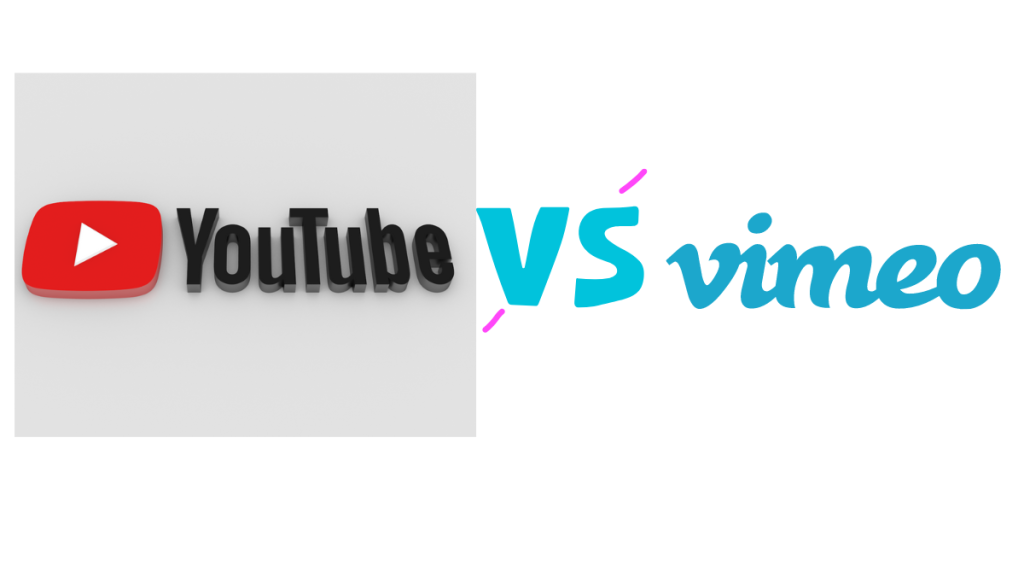If you’re running a business in the 21st century, chances are good that you’ve considered using video as a part of your marketing strategy. And if you’ve considered using video, chances are good that you’ve considered using YouTube vs Vimeo (or both) to host your videos. But which one is better for your business?

Let’s take a closer look at the pros and cons of each platform.
Youtube
YouTube is the largest and most popular video sharing platform on the internet. It’s easy to use and has a ton of features, including the ability to embed videos on other websites, share videos on social media, and more.
One of the biggest advantages of YouTube is that it’s free to use; you don’t have to pay anything to upload or watch videos. However, this also means that there are a lot of ads, both in the form of pre-roll ads that play before videos as well as banner ads that appear on the sides of the screen.
YouTube is also owned by Google, so if you’re trying to optimize your videos for search engine ranking, YouTube is a good option.
Vimeo
Vimeo is a less well-known video sharing platform that caters to a more creative audience. It’s popular with independent filmmakers, musicians, and other artists who appreciate its clean design and lack of ads.
Vimeo also offers a number of features that appeal to professionals, such as the ability to password-protect videos and remove the Vimeo branding from your player. One downside of Vimeo is that it’s not free; you have to pay to upload videos (although there is a free trial period).
Overall, Vimeo is a good option if you’re looking for a more polished experience and don’t mind paying for it.
Where Vimeo takes the edge?
1) Vimeo has better privacy controls.
YouTube is a public platform, which means that anyone can watch your videos without creating an account. This can be good or bad, depending on your business’s needs. If you want maximum exposure for your videos, YouTube is definitely the way to go.
However, if you want to keep your videos private (for example, if you’re creating training videos for employees), then Vimeo’s privacy controls make it a better option.
With Vimeo, you can choose who can watch your videos by creating password-protected viewing groups. You can also choose to make your videos unlisted, which means they won’t show up in search results or on your profile page.
2) Vimeo’s player is more customizable.
YouTube’s player is pretty basic; it has a few different size options and that’s about it. Vimeo’s player, on the other hand, offers a lot of customization options.
For example, with Vimeo, you can choose whether or not to show the video title and description, you can add captions and subtitles, and you can even choose from a variety of different playback speeds.
3) Vimeo offers more features for businesses.
YouTube offers some features that businesses can take advantage of, such as branded channels and video analytics. However, Vimeo takes things a step further by offering features like lead capture forms and call-to-action buttons that you can add to your videos.
These features make it easy to turn viewers into customers or clients.
YouTube Pros:
- More than 1 billion active users per month (that’s a lot of potential viewers for your videos!)
- Free to use (no need to pay for hosting)
- Built-in SEO features help your videos get found more easily
- Embedding options make it easy to add YouTube videos to your website or blog posts
- Offers customizable branding options, including watermarks and custom thumbnails
YouTube Cons:
- Ads can be intrusive and distracting for viewers (you can pay to have them removed, but that costs money)
- User comments can be negative or spammy
- You need a Google account to upload videos (which not everyone has)
Vimeo Pros:
- No ads!
- Higher quality video playback than YouTube
- More control over who can view your videos (great for privacy/security purposes)
- More creative freedom when it comes to branding your channel/videos
- Offers helpful analytics so you can track engagement with your videos
- Easy embedding options similar to YouTube
Youtube vs. Vimeo: Which is Better for Business? // continued…
Vimeo Cons:
- Not as large of an audience as YouTube (fewer potential views for your videos)
- Plans start at $7/month (not free like YouTube).
Conclusion
When it comes down to it, both YouTube and Vimeo have their pros and cons. However, we think that YouTube is the better option for businesses.
While it’s true that you have less control over who views your videos and there are ads, the sheer number of potential viewers makes up for those downsides. Plus, with built-in SEO features and easy embedding options, YouTube makes it easy to get your business’s videos seen by a wide audience. If you’re looking for a video hosting platform for your business, we recommend giving YouTube a try!